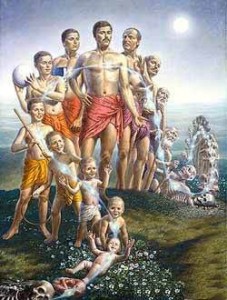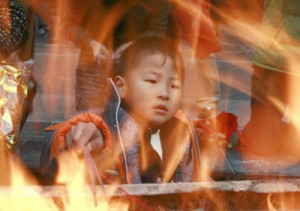An inventor–a man whose name I happily forget but who was called “Edison’s successor” by the interviewer—claimed recently that in 30 or 40 years science will be capable of making us immortal. The issue for 50-somethings like himself, he intoned, is to stay alive long enough to stay alive forever.
 Is it really necessary to repeat the obvious: that death is an intrinsic, inherent, and inescapable part of life? It obviously must be reiterated when such idiocy as this exists.
Is it really necessary to repeat the obvious: that death is an intrinsic, inherent, and inescapable part of life? It obviously must be reiterated when such idiocy as this exists.
Through reverse-engineering, the mechanisms in the human brain that store and organize memory into a more or less coherent self, we will, according to this scientist, be able to duplicate and download our precious selves, thus becoming ‘immortal.’
The prospect of perpetuating one’s self in the circuitry of a computer is a fate worse than death however. It is not life, and it is not death. It’s some kind of netherworld where the essential, animating, intangible aspects of life have been stripped away, leaving only the husks of humanness, and life.
Continuity is not immortality. Continuity is accumulation in memory and decay in the heart. True immortality involves dying to memory, thought, and self, while fully alive.
Many take solace in the idea that we may be close to replicating self-consciousness in computers, as if the separate self is the precious jewel that makes us human. Perhaps the trick of self-referential, closed-loop thought can be replicated in a computer. But the ‘me’ is nothing. There are infinitely more important things, like the true meaning of death, reincarnation, and immortality.
Life is not worth living without mystery, which is a completely different than mysteriousness. Science is concerned with resolving mysteries, not with enhancing the mystery of life. And the biggest mystery is death, which can never be ‘solved.’ Without physically dying, and without trying to make it a matter of scientific knowledge, can we understand and transcend death?
The self clings to so-called life, and so may continue in some form after death. Not as an individual entity, much less in some supernatural place, but perhaps in a vast reservoir of collective consciousness, recycled seemingly ad infinitum in the living generations. From this polluted pool, do some threads of personality and conditioning resurface amongst the living? Undoubtedly. Is that what’s meant by reincarnation? Yes.
some supernatural place, but perhaps in a vast reservoir of collective consciousness, recycled seemingly ad infinitum in the living generations. From this polluted pool, do some threads of personality and conditioning resurface amongst the living? Undoubtedly. Is that what’s meant by reincarnation? Yes.
I read an interesting quote the other day: “Reincarnation is a fact, but it’s not the truth.” It means, as I understand it, that reincarnation exists as a wheel of recycled ignorance, to which we humans are chained. But the wheel has grown so encrusted and ponderous that it’s killing the human spirit, not to mention the planet. Therefore it’s not just a matter of individual concern that we free ourselves of this cumulative wheel of memory and experience. The future of humanity depends on our doing so.
Death is and will always be a crucial part of life. Is what we fear as death simply the infinite ground from which the cosmos arose, and to which everything returns? Is death, faced while embracing life, synonymous with awareness, love, and God?
It’s mid-day, and the sun slowly crosses the sky, sunlight passing over the dense foliage like water passing over the pebbles and stones in the stream. It’s all the same movement, and if thought is very quiet and the brain very attentive, one is inextricably part of that single movement of life and death.
It isn’t man’s knowledge of death that makes us afraid, as anthropologists have often said. (If animals only knew, they would be afraid too, they say.) Rather, it is the desire for permanence in life or after life that puts us in existential conflict with life, in which there is the omni-present fact of death.
Though just early afternoon, it’s already very hot. In the shade next to the stream it’s pleasant, but a half hour walk along the dusty paths drenches one in sweat.
I lie on my back in the shallow stream and float down with the current, looking up through the canopy of oaks and sycamores to the cerulean sky. For 100 meters or so, I hold my breath and my sandals don’t touch the stones.
With a jolt, the insight hits me: if one totally lets go, this is what death feels like. The movement, stillness, light, color, and silence carry you on an immeasurable current to the ocean.
Letting death come near, one sees there is nothing to fear. In dissolving the past in attention and awakening fully, there is just awareness.
We can consciously touch the ground from which we came. What need then to reincarnate? Isn’t that journey of awareness what it truly means to be a human being?
Martin LeFevre

